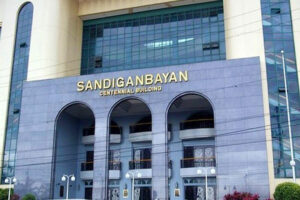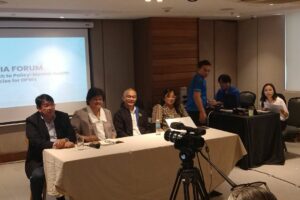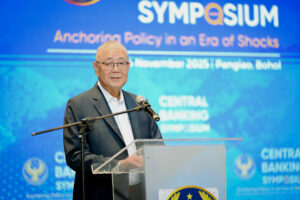By Kenneth Christiane L. Basilio, Reporter
THE PHILIPPINES’ anti-graft court on Wednesday assigned the first set of corruption charges against a resigned lawmaker at the center of a multibillion-peso flood control scandal that has gripped the Southeast Asian nation.
Three divisions of the Sandiganbayan will hear the cases, which include two counts of graft and one count of malversation through falsification filed by the Office of the Ombudsman on Tuesday against ex-Party-list Rep. Elizaldy S. Co and several other officials linked to misuse of public funds, according to the court’s website.
Lawyer Ruy Albert S. Rondain, Mr. Co’s counsel, did not immediately reply to a Viber message seeking comment.
The Sandiganbayan is a special court tasked with hearing graft and corruption charges. It is divided into divisions to allow for quicker disposition of cases. Mr. Co’s first graft charge will be heard by the fifth division, headed by Associate Justice Zaldy V. Trespesses.
The other graft charge, based on accusations that Mr. Co received “unwarranted” benefits from an allegedly anomalous state transaction, was assigned to the seventh division led by Associate Justice Lorifel Lacap-Pahimna.
The malversation charge against Mr. Co and others linked to alleged impropriety linked to anomalous flood control deals was raffled to the sixth division presided over by Associate Justice Sarah Jane T. Fernandez, the longest-sitting judge of the anti-graft court.
The complaints against Mr. Co and other officials stemmed from a P289.5-million dike project running along a river in the province of Oriental Mindoro south of Manila. The Independent Commission for Infrastructure (ICI) had flagged irregularities in the procurement, construction, and implementation of the flood control project.
Public Works Secretary Vivencio B. Dizon and Oriental Mindoro Governor Humerlito A. Dolor saw in September that steel sheets used in the flood mitigation project were below the mandated 12-meter specification, measuring only 3 meters, and that the material was found to be substandard.
The government of President Ferdinand R. Marcos, Jr. is grappling with a widening flood control scandal that has implicated politicians, officials and contractors in an alleged kickback scheme tied to public works projects in the disaster-prone country.
Mr. Co, who previously led the House of Representatives Appropriations Committee, had accused Mr. Marcos and former House Speaker Ferdinand Martin G. Romualdez of orchestrating the fraud. The President had received billions in kickback funds, he alleged in a series of videos released on his Facebook page last week. The Palace spokesperson denied the accusations against Mr. Marcos.
Meanwhile, the National Unity Party (NUP), the second-largest political party in the House, said that Mr. Co’s statements should be “cast into serious doubt.”
“Put simply, we believe Mr. Co is lying,” it said in a statement on Wednesday.
Mr. Co’s office did not immediately reply to a Viber message seeking comment.
“These grave allegations, if true, would constitute criminal conduct,” the NUP said. “Yet they rest entirely on Mr. Co’s statements not made under oath, uncorroborated and made while he remains outside the country and beyond the reach of lawful inquiry.”
Mr. Rondain had earlier said that Mr. Co went abroad to seek medical treatment, and the former lawmaker is reluctant to return to the Philippines over threats against his life.
The government is seeking to compel his return, with the Justice department requesting a blue notice from Interpol and planning to seek a red notice once the Sandiganbayan issues an arrest warrant for the non-bailable offense.
The political party said that ICI should exercise caution and not take Mr. Co’s allegations at face value, urging “judicious discernment in its investigation” into the multibillion-peso scandal.
“It would be a grave miscarriage of justice to pursue investigations based solely on unverified allegations,” NUP said.
NEW AFFIDAVITSAlso on Wednesday, the ICI planned its referral of cases involving several senators to the Office of the Ombudsman as it reviews new affidavits submitted by former Public Works undersecretary Roberto M. Bernardo.
“We are re-evaluating everything because of the affidavit of (former) Undersecretary Bernardo… We’re studying that,” ICI Chairman Andres B. Reyes, Jr. told reporters in a briefing.
He said the latest submission prompted the commission to review earlier case assessments, including those linked to three senators implicated in the flood control scam.
The commission initially expected to proceed with the referrals this week, but the schedule was pushed back after a planned hearing with Mr. Bernardo on Monday was cancelled due to his state-witness application.
“We’ll have a delay of maybe ten days from last Friday. Hopefully, we’ll finish it,” Mr. Reyes said.
Mr. Bernardo’s supplemental affidavit, which the ICI earlier said mirrors the one he submitted to the Senate Blue Ribbon Committee, implicated additional individuals, including former Department of Public Works and Highways (DPWH) Secretary Manuel M. Bonoan, who is currently abroad, as among those who allegedly received kickbacks from infrastructure projects.
Mr. Bernardo, in his sworn statements, also admitted facilitating alleged kickbacks for two incumbent senators, a cabinet secretary, two former senators, a former district representative, a city mayor, and another former public works undersecretary.
Meanwhile, the Department of Budget and Management (DBM) may be invited to its future hearings for a “study of the budget process,” with Mr. Reyes hinting that the commission intends to invite the agency’s new officer-in-charge.
Also on Wednesday, Batangas Rep. Leandro Antonio L. Leviste accused a fellow congressman of impropriety linked to around P22 billion of questionable infrastructure projects under this year’s DPWH budget.
He said there was “documentary evidence” supporting his allegations that the accused lawmaker “obtained and conspired” with the DPWH to rig the bidding process for the contracts to favored construction firms. — with Erika Mae P. Sinaking






